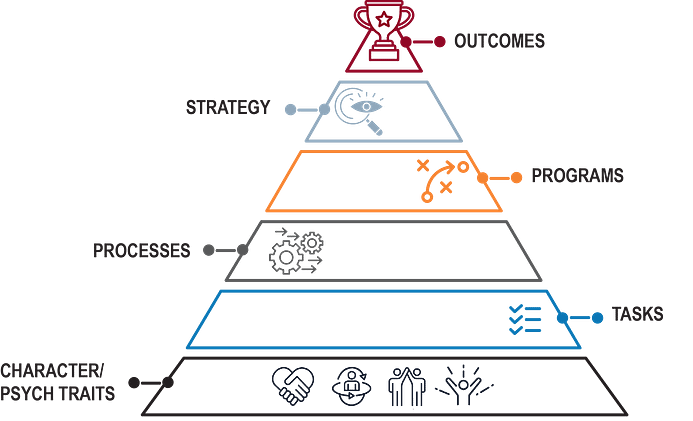For 300 years, our society has looked to develop people that could do tasks proficiently. That was core to the industrial revolution. For the most part, that era is OVER.
Because of automation and the freer movement between various jobs and careers, organizational success depends much more upon employees being able to think, reason, create and communicate effectively. Learning agility is a new buzzword to capture this concept. With AI, I think this will become even more important as task automation that might be afforded with AI may take away even more tasks that might have seen as simply the purview of humans.
However, our society hasn't set up structures to guide our youth, young adults or employees to develop the foundations and processes to connect experiences and knowledge in more novel ways. We have simply expected people to obtain those skills (or not) over time on their own.
Let me explain how helping our youth and young professionals better connect inputs can do for organizations and society.
Think about what success in an organization means. It's likely some quantifiable metric - sales, on-time performance, test scores.

Let's look at customer service performance. Let's say that measure is 95% customer satisfaction. That's what gets reported every month or every week.
What are the key drivers to hitting that metric? One of them might be percentage of incidents handled to close during the initial contact. There are many components to one call resolution - technological, procedural, legal, etc. Let's look at empowering service reps to make decisions that facilitate resolution.
To give those reps such a capability, you need to train and develop them in the various processes and tools to help them make that happen. There's practice, trial and error, review and feedback over time to refine capabilities.
To be truly successful at this, however, these reps need to develop the mental capabilities to process all of the inputs, be ready to listen and communicate, understand ramifications of their actions as well as interact with customers in a constructive way. That takes a lot of mental capability - not to mention solid character, psychological, analytical and soft skill traits to - to be consistently successful.
Devleoping your service team to be able to do that brings great benefit to all.
Let's look at how this works with basketball (I go into a deeper analysis of this using the experience of my son, Jeremy, during his historic senior season at Carleton College)
- The key metric is winning on the scoreboard.
- Key drivers are scoring points and keeping the other team from scoring more than you.
- Components for those drivers are shooting, passing, rebounding, individual and team defense and turnovers.
- Teams and players practice these components on a daily basis to get better on the fundamentals as well as tying them together in the team concept to function optimally.
- The players that stand out have the mental and character traits to get the most of their fundamental work, are open to ways to improve in those areas, accept and excel in their role and understand the dynamics of the game to see opportunities one or two passes ahead.
Mental capability, mental training, mental development is the key to facilitating tactical capability. Training mental capability is key to developing employees that can handle new challenges, new roles, conflict and opportunity. It's key to having employees feeling connected to a place, aligned with the mission and vision and want to stay.
You want to hire people with solid character traits to have the best chance at success with mental training, but that's a topic for a different post.
Is your organization working on developing the mental capabilities of employees and their ability to think, reason, analyze, question, communicate on a different level? Are leaders trained and practiced in this skill? If not, maybe you should consider bringing someone in to help your employees in this critical area of success for your company. You'll be better off for it.
